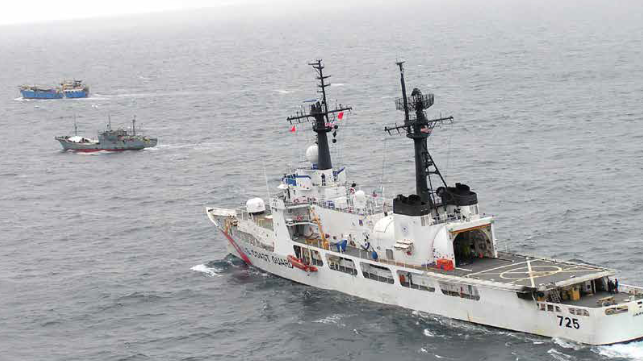The Pentagon Wants Programmers' Help to Catch IUU Fishing Activity

The Pentagon is partnering with the NGO Global Fishing Watch to draw new talent and fresh ideas to the problem of tracking illegal fishing activity from space.
The "xView3" AI contest is co-sponsored by the Defense Innovation Unit, and it comes with a prize of $150,000. It is intended to attract software developers who want to tackle the challenge of detecting "dark" IUU fishing vessels, which don't publicly broadcast their location or appear in public monitoring systems.
Fishing vessels are small targets in a big ocean, and when they turn off their AIS signals, they are hard to track. However, the U.S. Department of Defense has ample access to satellite surveillance capabilities, including space-based synthetic aperture radar (SAR). This remote sensing technology easily penetrates clouds and weather systems, and radar-reflective objects - like steel decks and topsides - show up bright and clear against the backdrop of the sea.
The DOD has synthetic aperture radar data covering all of the world's oceans; the question, however, is how to spot suspicious activity in that mountain of imagery. It is far too much to scan for human eyes, but it is an ideal task for computing, given the right algorithm. If a good solution can be found, it would be valuable to the Pentagon, as IUU fishing is considered a destabilizing activity of interest, particularly in the Indo-Pacific.
''IUU fishing undermines a nation's sovereignty, threatens its economic security, and weakens global rules-based order,'' said said Vice Adm. Scott Buschman, U.S. Coast Guard deputy commandant for operations. ''The United States can provide global leadership to combat IUU fishing by creating partnerships and collaborative, durable networks. Our collective efforts start with maritime domain awareness."
Competitors will get access to a giant trove of synthetic aperture radar imagery, which they can use to "train" AI machine learning algorithms to look for IUU fishing patterns. The prize will be awarded to U.S. or international participants – individuals or companies – with the best performing algorithms. The Pentagon and Global Fishing Watch will share the open-source algorithms, "reflecting the organizations' vision of harnessing open-source, low-cost data to advance maritime domain awareness."

that matters most
Get the latest maritime news delivered to your inbox daily.
"We can help eliminate illegal fishing by making the best solutions open and applying them to a global, free data set that enables other actors to also benefit from these highly scalable tools. The more people that can use these tools, the faster we will reduce the scope for bad actors to operate in our ocean," said Paul Woods, chief innovation officer at Global Fishing Watch.
The DIU's xView challenge series has a strong record of success. The last, xView2, produced a natural-disaster damage detection algorithm that was used to inform operational responses to the 2019-2020 fires in Australia, the 2020 California fire season and the 2020 U.S. hurricane season.
